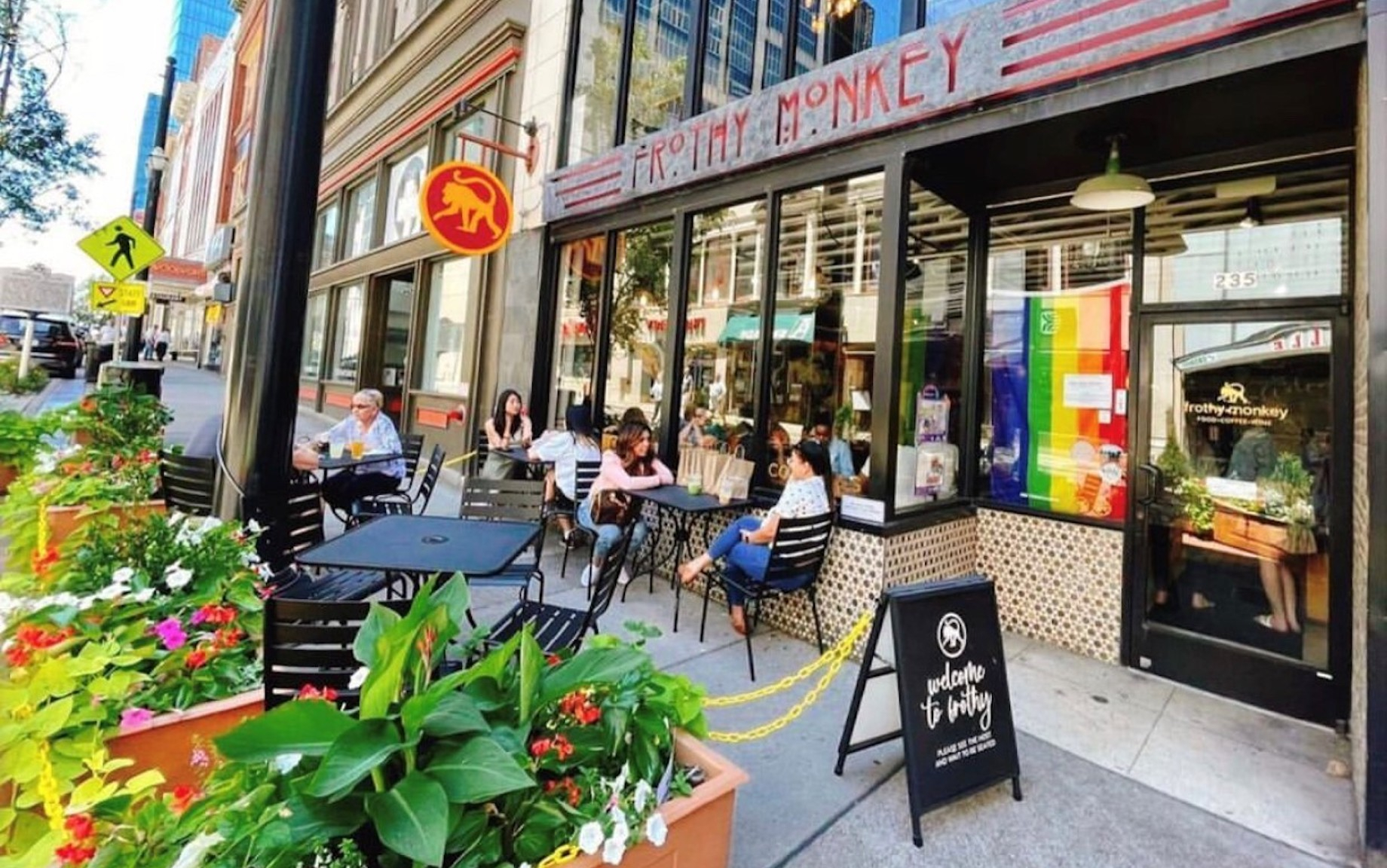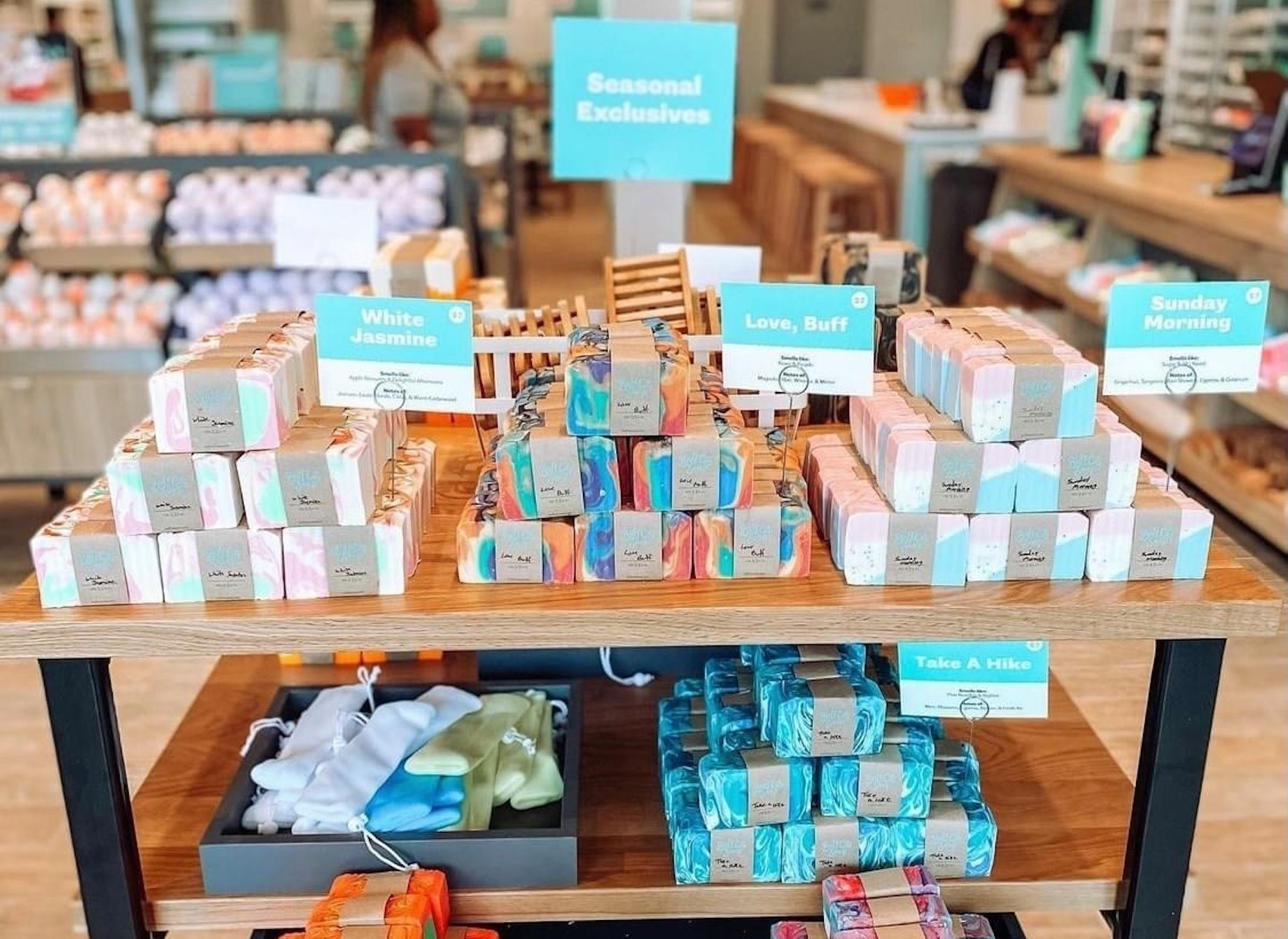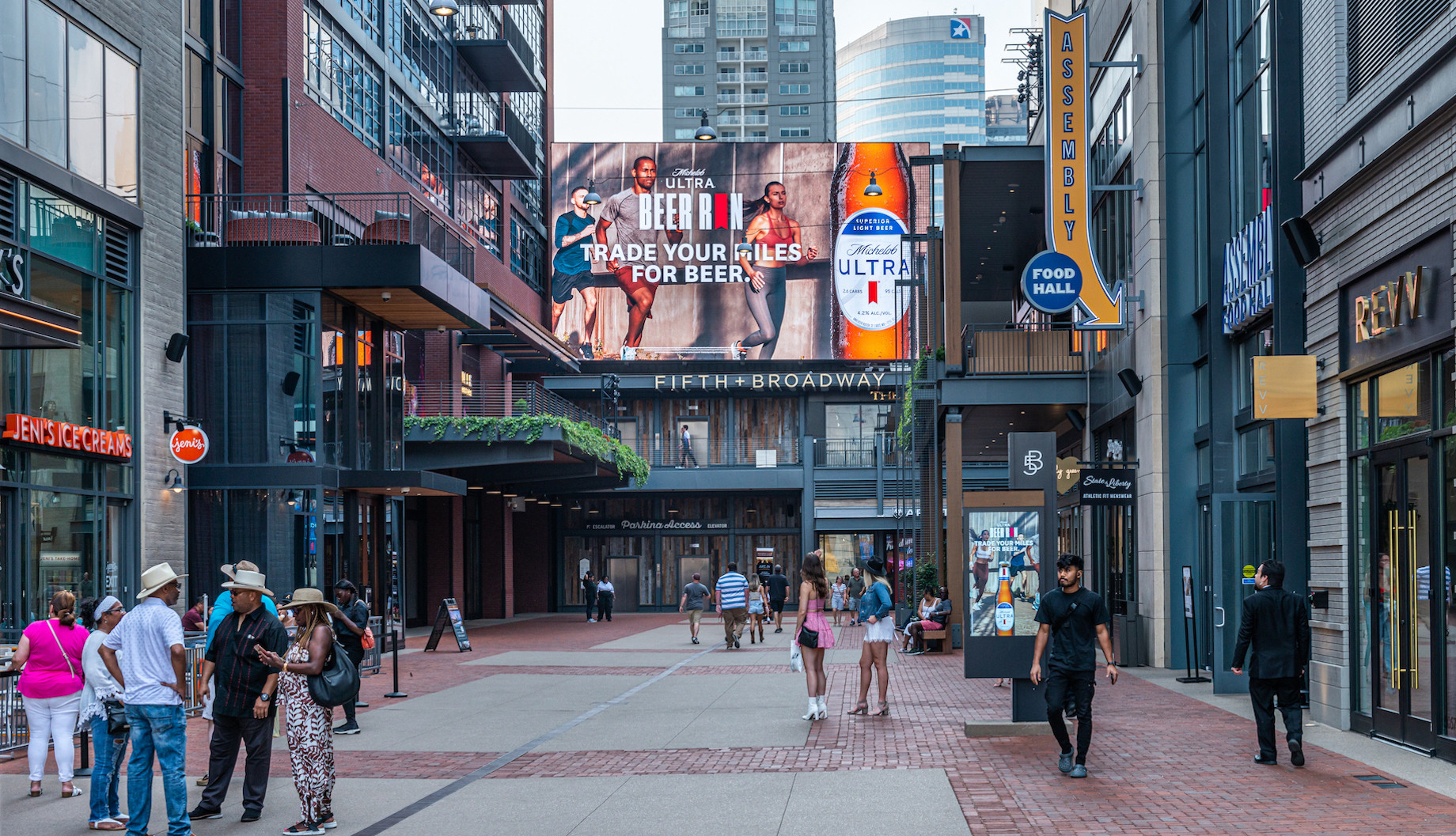Before COVID-19, broker Elam Freeman would call retailers and restaurateurs to gauge their interest in entering the Nashville market. “If we got a call back,” the founder and principal of Nashville-based Ojas said, “it was like, ‘Nashville is the 2025 market for us. We don’t know that the [demographics], the density, etc., are there yet.’” Today, she said, “we have the same tenants knocking down our doors, especially like the omnichannel brand side. They’re saying, ‘Our e-commerce sales are skyrocketing, and in Nashville, we have to get brick-and-mortar.’ It’s like never before.” Four such retailers that have signed for space and/or opened in Nashville are LoveShackFancy, Grace Loves Lace, Stoney Clover Lane and Teressa Foglia.
Crissy Cassetty, director of economic development for the nonprofit Nashville Downtown Partnership, witnessed a similar shift in retailer interest in Music City. The partnership hired her during the Great Recession to recruit more retailers — those outside Nashville, as well as beyond the state — to downtown Nashville, an area spanning 1.8 square miles. “They would just kind of look at me,” Cassetty recalled. “They would say, ‘You want me to expand my business, A, and you want me to go downtown?’ which was a totally different area of the city in 2008.” That year, she said, 15 new retailers opened downtown. This year so far, 86 have opened or announced they’re coming to downtown, she said.

Frothy Monkey at 235 5th Ave. N. Photo courtesy of Nashville Downtown Partnership
Today, Nashville gets points for being a capital city with a relatively low cost of living and four seasons. It has consistent in-migration, a booming rate of tourism and a growing residential population. It is clean and feels safe, boosters said. Quite a few major companies are headquartered in Nashville or plan to establish roots in Music City, such as asset management and research firm AllianceBernstein, which moved there this year from Manhattan; software giant Oracle, which is bringing 8,500 jobs and making a $1.2 billion investment in Nashville; and Amazon, which is establishing 5,000 corporate jobs there.
Where the buzz came from
One of Nashville’s big draws is that it is home to the country music industry; the Academy of Country Music recently announced it will relocate from Los Angeles to Nashville. Another factor is the number of celebrity-backed retail businesses, Freeman said, such as TV personality Kristin Cavallari’s first Uncommon James store, country-pop singer-songwriter Jessie James Decker’s first brick-and-mortar Kittenish, singer-songwriter Holly Williams’ H. Audrey and actress Reese Witherspoon’s Draper James.
The celebrity factor also applies to fitness and club spaces like Boothcamp from The Bachelorette’s Shawn Booth, TruMav Fitness from country star Tim McGraw and The Twelve Thirty Club from singer-songwriter Justin Timberlake. In addition, musical soap opera Nashville drew a lot of interest to the city. The show, said, Cassetty, “opened people’s eyes about what Nashville is. That really helped put more attention on our city.”
Pandemic recovery
While Nashville’s retail market was hit in the early months of the pandemic, “key indicators continued to improve the last few quarters,” per a third-quarter 2021 report from Colliers Nashville. For the metro area, vacancies decreased 40 basis points from the second quarter to the third quarter to 5%.
Tenant representative Justin Schad, vice president of TSCG, said COVID “has really identified and rewarded the successful tenants, the relevant concepts or brands. And those tenants have been active through COVID,” while the pandemic accelerated the demise of retailers that were already struggling.
Restaurants have been the hardest-hit category in Music City, and one retailer, Buff City Soap, has backfilled restaurants that have closed in Nashville, such as Qdoba in Brentwood and Subway in Cool Springs, according to Schad, who represents the franchisee who took the locations. “Through COVID,” Schad said, “we have rolled out new locations in Hendersonville, Murfreesboro, Hermitage, Gallatin, Cool Springs, Green Hills, Columbia, Smyrna and Brentwood.”

Buff City Soap has been successful because it has a unique business: Its plant-based bath bombs, shower fizzies, body butters, laundry soaps, shave soaps and shower oils are made onsite at each location daily, as at this location at 3811 Green Hills Village Dr., said TSCG vice president Justin Schad. Photo courtesy of Glow Brands
Grocery store sales increased through COVID, and Publix has expanded its footprint in the metropolitan statistical area.
Colliers Nashville founding partner Tony Vaughn represents tenants in Tennessee like Starbucks, Chase and Bloomin’ Brands, which owns Outback and other restaurant chains. He said there were some “pauses” during the early months of the pandemic for the mom-and-pop stores but the chains “ramped up because they have company-designated growth goals and the capital to support the growth in a down market.”
While Colliers data indicates that Nashville’s retail inventory has grown by 5.7% since 2016, Rob Foss, senior vice president of retail and mixed-use at Avison Young in Nashville, said there is a dearth of large retail space available. He signed a deal recently with Lighthouse Immersive to sublease a two-story, 57,000-square-foot former Harris Teeter at 4416 Ridgefield Way, just outside the urban core of the city. “It was the only box in the city available,” Foss noted. Lighthouse Immersive will open a Van Gogh exhibit there on Dec. 9.

Lighthouse Immersive’s Nashville venue will feature the same 35-minute film on loop as showcased in Immersive Van Gogh Exhibit Las Vegas, pictured here at the Oct. 7 VIP opening night party and ribbon cutting. Photo redit: Denise Truscello
Nashville had been on Lighthouse Immersive’s radar as “a good opportunity with the city’s support of music, the arts and culture,” said Lighthouse Immersive’s broker, Lee Dickson, a managing director in the entertainment practice at Baum Realty Group. “A significant portion of their population has migrated from larger cities to the north and east, and they will, of course, be eager for their new experience in their adopted home.”
The “best thing to happen to downtown” this year
With so much interest in Nashville, many big developers are working on capital-intensive mixed-use developments in the area. “Pricing per square foot is up tremendously on redevelopment sites and land sites, [and] cap rates have compressed tremendously,” said Nashville investment sales broker Clay Smith, a senior associate at Matthews Real Estate Investment Services. “Buyers are more aggressive on terms and price. Transaction velocity and the amount of properties changing hands in Nashville has drastically increased.”
Fifth + Broadway officially opened downtown in June. Completed by Brookfield Properties and partners, the $450 million, open-air, L-shaped project houses 256,000 square feet of retail, including 56,000 square feet for the National Museum of African American Music and 100,000 square feet for a food hall; a 381-unit, 34-story apartment tower; and a 26-story office building. This year, “the best thing to happen to downtown was Fifth + Broadway,” said Cassetty. “It has over 200,000 square feet of retail, and it’s smack-dab in the middle of our downtown.”

The retail component of Fifth + Broadway is home to Assembly Food Hall, an Apple store, The Twelve Thirty Club and Eddie V’s Prime Seafood. Credit for photos above and at top: Sam Calderon
Fifth + Broadway is 85 percent occupied and 95 percent leased, according to Brookfield senior director of development Wendy Welch. Anchor office tenant AllianceBernstein moved into its 218,976-square-foot headquarters this July, per Welch. According to Justin Sturdivant, a first vice president of investments for Marcus & Millichap: “The Fifth + Broadway development changed the landscape of retail there because it brought Apple to the corner. That is the first national presence on Lower Broadway.”
Other game-changing projects
Nearby, Propst Development has planned Broadwest, a 3.9-acre community on a full city block. It includes 510,000 square feet of Class A office, 100,000 square feet of creative office, 42,000 square feet of retail, 196 residences, 2,500 onsite parking spaces and a four-star, 237-room Conrad Nashville hotel by Hilton. Vaughn, who is helping market the retail space, confirmed that Charleston-based Halls Chophouse, Starbucks, Sola Salon Studios and ServisFirst Bank have signed on. Only 9,780 square feet of retail remains available.
Southwest Value Partners is developing Nashville Yards on 18 acres downtown. It will be home to Amazon’s East Coast operations hub; the e-commerce giant has completed 540,000 square feet in Tower 1, and 580,000 is slated for Tower 2, which is under construction. Nashville-based Pinnacle Financial Partners is relocating its headquarters to Nashville Yards and is considered the “founding partner” of the project, while Tennessee-based law firm Bass Berry & Sims is setting up shop there, too. The project includes a 591-room Grand Hyatt, which opened in October 2020, and the renamed Union Station Nashville Yards Autograph Collection hotel, which the developer acquired this summer.

Nashville Yards. Rendering courtesy of Gresham Smith/Southwest Value Partners
Upon completion, the over 6 million-square-foot Nashville Yards will feature 185,000 square feet of retail, food and beverage tenants and entertainment space. Part of the entertainment and retail will be a joint venture with AEG. Only 9,000 square feet of retail is built, and it has been leased up by Crisp & Green, Orangetheory Fitness, Starbucks, The Urban Juicer + Eatery and a Pinnacle Bank branch. Southwest Value Partners director of strategic design Joe Bucher said Nashville will have a “variety of fresh, next-generation retail options that will be carefully selected to align with the overarching project vision and local demands.”
Hensler Development Group and Stiles are co-developing Peabody Union at Rolling Mill Hill, a multi-structure development with office, residential and 105,000 square feet of retail. “Nashville, like Charlotte and Raleigh, where we also are active, is an incredibly appealing market for people to live and work, as demonstrated by the rapid growth in the last decade,” said Stiles vice president of marketing Adrienne Zalkind, “and we think it will only get stronger.”
Two other larger projects with retail components coming up are River North and Reed District. MRP Realty and Creek Lane Capital have broken ground on the 80,000-square-foot Phase 1 of the 1.3 million-square-foot, master-planned River North. In early November, Barings and Hines formed a joint venture to acquire the Reed District site in Midtown for a 2.7 million-square-foot multi-phase, mixed-use project.
In the suburb of Franklin, Holladay is planning The Factory, a 300,000-square-foot adaptive reuse project that will be half office and half retail, restaurants and entertainment venues. “It will be the first adaptive reuse retail opportunity with scale in Franklin,” said Freeman, who is helping market the retail portion. “There are other opportunities where there is critical mass, and there’s other adaptive reuse, but there are none where the two intersect together.”
RELATED: Turning a 1929 stove factory outside Nashville into a modern marketplace
And developers are putting down their own roots in Nashville. “I’m currently working out of a WeWork along with another Eagle Point member we hired,” said Alex Vouvalides, a founding partner of Eagle Point Capital Partners, which established a Nashville office this July, the same time it opened an office in Los Angeles. “We chose Nashville due to its central location to many of the markets we are looking to invest in — we can get to 80% of the U.S. in two hours or less by plane — [and] quality of life, and it’s a growing dynamic city that we also want to invest in. We also assumed we could attract a lot of talent from a recruitment standpoint.”
All told, area advocates say Nashville has it all. “You won’t find a city more accommodating, authentic and accessible than Nashville,” said Cassetty. “We have plenty of rooms, a state-of-the-art convention center, a music scene that is second to none, rock-star chefs and so much more to offer the perfect collaboration of business and pleasure.”
By Lauren Elkies Schram
Contributor, Commerce + Communities Today